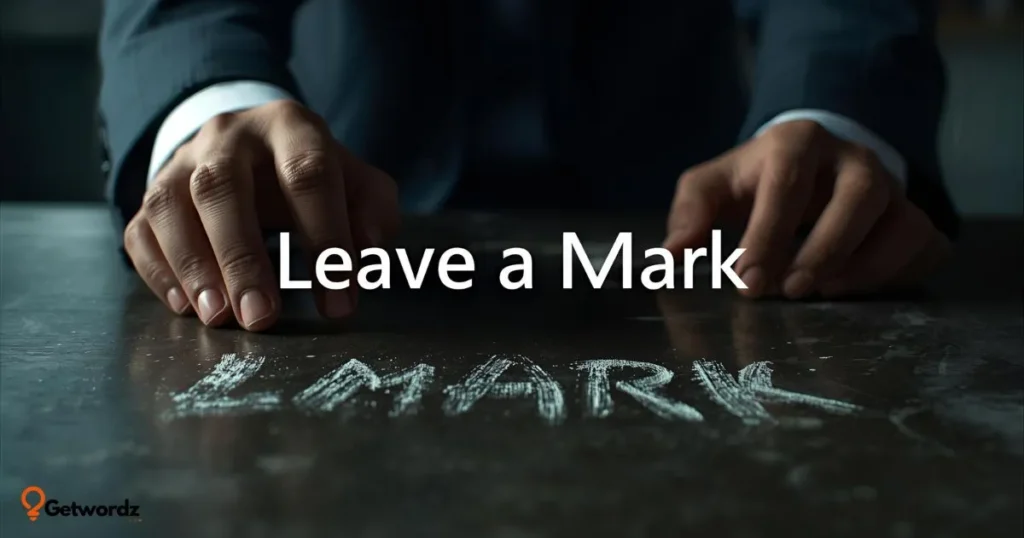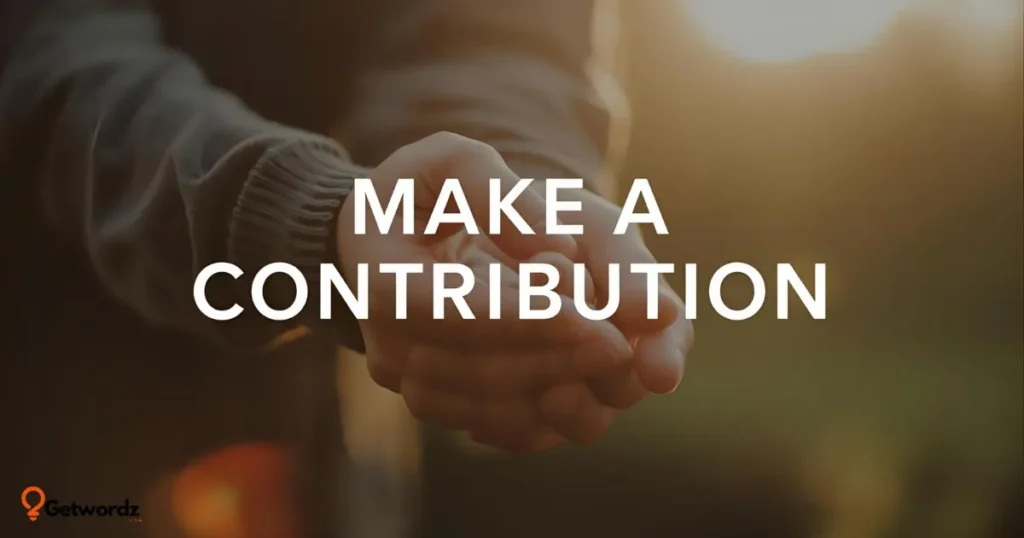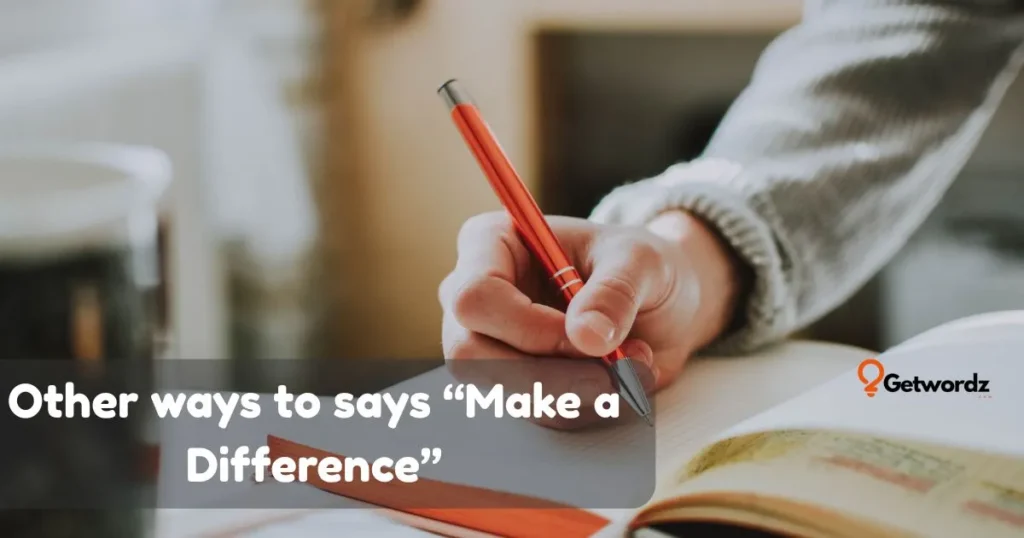“Make a difference” means to create a positive impact that truly matters. Whether it’s helping a friend through a tough time, volunteering for a cause, or brightening someone’s day, this phrase shows the spirit of kindness and purpose. But it’s also a phrase people use so often that it can lose its real meaning.
Many search for “make a difference” because they want to express how their actions matter. Still, saying it the same way every time can sound plain or repetitive. If you’re looking for different ways to say “make a difference” or creative alternatives that sound more genuine and heartfelt, you’re in the right place.
In this post, you’ll find fresh and meaningful expressions that help your message feel real and sincere. Whether you’re talking to friends, coworkers, family, or sharing something online, these unique phrases will help you sound natural, confident, and inspired.
Ready to discover new ways to express the power of making an impact? Let’s get started.
1. Create an Impact
Scenario: You’re working on a community project and want to motivate your team to stay committed.
Explanation: “Create an impact” is a confident and motivational phrase that fits both professional and personal contexts. It’s a better way to say “make a difference” when you want to sound purposeful and results-driven.
Examples:
- “We all have the power to create an impact in someone’s life.”
- “Her speech really created an impact on the audience.”
- “Volunteering helps me create an impact beyond my daily routine.”
Why It Works: It’s simple, inspiring, and action-oriented, perfect for anyone aiming to show positive influence and real change.
2. Inspire Change
Scenario: You’re writing a social media caption after supporting a local charity.
Explanation: This phrase adds emotion and motivation, showing how your actions encourage others. It’s a creative alternative that focuses on inspiring transformation rather than just helping.
Examples:
- “Every act of kindness can inspire change.”
- “Her story inspired change in the whole neighborhood.”
- “You don’t have to be famous to inspire change.”
Why It Works: It captures heart and purpose, ideal for emotional or motivational messages.
3. Leave a Mark

Scenario: After finishing a meaningful project at work, you want to express pride in your effort.
Explanation: “Leave a mark” is casual yet powerful. It means to do something memorable that lasts. This unique expression fits everyday talk and personal reflection.
Examples:
- “He left a mark on everyone he met.”
- “I hope my work leaves a mark in this industry.”
- “Teachers leave a mark that lasts a lifetime.”
Why It Works: It’s simple, emotional, and relatable, perfect for showing personal legacy.
4. Make an Impact
Scenario: You’re encouraging your team before launching a community event.
Explanation: A strong motivational variation of “make a difference,” this phrase works in both personal and professional settings. It emphasizes action and measurable results.
Examples:
- “Together, we can make an impact that matters.”
- “Small efforts can make a big impact.”
- “She’s always looking for ways to make an impact at work.”
Why It Works: It sounds fresh, modern, and inspiring, great for speeches, campaigns, and teamwork.
5. Change the World
Scenario: You’re speaking at a school or writing an inspiring post about kindness. Explanation: “Change the world” is emotional, big-picture, and timeless. It’s a bold alternative that encourages action for a greater cause.
Examples:
- “You don’t need superpowers to change the world.”
- “Education can change the world.”
- “She believes creativity can change the world.”
Why It Works: It’s uplifting and visionary, appealing to readers who value purpose.
6. Touch Lives
Scenario: You’re thanking volunteers for their contribution.
Explanation: This phrase focuses on emotional connection and empathy. It’s a heartfelt way to say “make a difference” in people’s lives.
Examples:
- “Your kindness has touched so many lives.”
- “Doctors touch lives every single day.”
- “We all have a chance to touch lives in small ways.”
Why It Works: It adds warmth and sincerity, perfect for messages of appreciation or compassion.
7. Bring Change
Scenario: You’re discussing social or workplace improvements.
Explanation: “Bring change” is straightforward and a simple alternative to “make a difference.” It’s flexible and easy to use in conversations.
Examples:
- “Every voice can bring change.”
- “They worked hard to bring change to their community.”
- “Innovation brings change that lasts.”
Why It Works: Its simplicity makes it relatable and easy for anyone to use.
8. Make Things Better
Scenario: You’re talking about small acts that improve daily life.
Explanation: This phrase is casual and optimistic, focusing on progress and positivity.
Examples:
- “I just want to make things better for everyone.”
- “Her feedback always makes things better.”
- “Kindness can make things better than we imagine.”
Why It Works: It’s friendly and natural, perfect for everyday use and heartfelt messages.
9. Spark Change
Scenario: You’re writing a post about starting a new movement or idea.
Explanation: “Spark change” adds energy and excitement, showing how small actions can start something big. It’s a creative phrase that feels modern.
Examples:
- “Your words can spark change.”
- “Artists have the power to spark change through creativity.”
- “Let’s spark change together.”
Why It Works: It’s short, energetic, and motivational, ideal for inspiring others to take the first step.
10. Make an Impression

Scenario: You’re preparing for a job interview or presentation.
Explanation: This phrase shifts focus from changing outcomes to influencing people’s thoughts. It’s a professional alternative to “make a difference.”
Examples:
- “I hope my ideas make an impression on the team.”
- “Her kindness always makes an impression.”
- “A smile can make a lasting impression.”
Why It Works: It blends professionalism with personal warmth, great for both formal and casual contexts.
11. Make an Effort
Scenario: You’re encouraging a friend who feels discouraged about helping others.
Explanation: “Make an effort” focuses on taking action, no matter how small. It’s a simple alternative to “make a difference” that highlights persistence and care.
Examples:
- “Even a small gesture shows you made an effort.”
- “We all should make an effort to listen more.”
- “He made an effort to support his team during hard times.”
Why It Works: It’s realistic and humble, showing that positive change starts with trying rather than perfection.
12. Do Something Meaningful
Scenario: You’re reflecting on life goals or career choices.
Explanation: This phrase is thoughtful and emotionally deep, ideal for describing actions that have purpose and fulfillment.
Examples:
- “I want to do something meaningful with my time.”
- “She’s always looking for ways to do something meaningful.”
- “Traveling to teach abroad felt like doing something meaningful.”
Why It Works: It connects intention with purpose, making it relatable for readers focused on personal growth or community impact.
13. Make a Positive Impact
Scenario: You’re writing a post about environmental or social awareness.
Explanation: A modern and upbeat way to say “make a difference,” this phrase stresses optimism and constructive action.
Examples:
- “Together, we can make a positive impact on the planet.”
- “Small choices make a positive impact every day.”
- “He’s known for making a positive impact at work.”
Why It Works: It sounds inspiring and inclusive, motivating readers to take part in meaningful actions.
14. Uplift Others
Scenario: You’re encouraging kindness and emotional support among friends.
Explanation: “Uplift others” has a warm and emotional tone, perfect for expressing encouragement or empathy.
Examples:
- “We rise when we uplift others.”
- “Her words always uplift others during hard times.”
- “He used humor to uplift others at work.”
Why It Works: It carries emotional power and positivity, helping your message feel genuine and heartfelt.
15. Contribute to Change
Scenario: You’re joining a cause or community campaign.
Explanation: “Contribute to change” is a formal and purposeful phrase that highlights teamwork and collaboration.
Examples:
- “Everyone can contribute to change in their own way.”
- “She contributed to change through education.”
- “This project helps employees contribute to change at work.”
Why It Works: It emphasizes collective effort and purpose, fitting perfectly in professional and social settings.
16. Do Good
Scenario: You’re motivating kids or friends to take kind actions.
Explanation: Short and simple, “do good” is a friendly and easy-to-remember phrase that feels natural in everyday talk.
Examples:
- “Go out there and do good today.”
- “He believes in doing good wherever he goes.”
- “Doing good doesn’t require money, just heart.”
Why It Works: Its simplicity makes it universal, appealing to all ages and audiences.
Read More: Other Ways To Say “Pretty” With Examples!
17. Be the Change
Scenario: You’re writing an inspirational quote or personal reflection.
Explanation: Inspired by Gandhi’s famous quote, “Be the change” is a motivational and empowering way to inspire responsibility.
Examples:
- “Be the change you want to see in the world.”
- “She truly believes in being the change through her work.”
- “Start small and be the change in your community.”
Why It Works: It’s timeless, powerful, and easily connects with readers who believe in personal responsibility.
18. Make a Contribution

Scenario: You’re acknowledging someone’s effort at work or school.
Explanation: This phrase sounds professional and appreciative, ideal for recognizing teamwork and dedication.
Examples:
- “Thank you for making such a valuable contribution.”
- “Every contribution helps the project grow.”
- “She made a contribution that improved everyone’s workflow.”
Why It Works: It’s respectful and versatile, making it suitable for professional, academic, or volunteer contexts.
19. Leave a Legacy
Scenario: You’re talking about long-term influence or achievements.
Explanation: “Leave a legacy” is a meaningful and reflective phrase that focuses on lasting impact.
Examples:
- “He worked hard to leave a legacy of honesty and kindness.”
- “Artists leave a legacy through their creations.”
- “I hope to leave a legacy that inspires others.”
Why It Works: It appeals to emotion and ambition, ideal for discussions about purpose and memory.
20. Empower Others
Scenario: You’re mentoring someone or running a leadership workshop.
Explanation: “Empower others” means giving people confidence and support to succeed. It’s a positive and professional expression that builds trust.
Examples:
- “True leaders empower others to grow.”
- “Her mission is to empower others through education.”
- “We should empower others to make their own choices.”
Why It Works: It promotes positivity, collaboration, and leadership, core values of making a difference.
21. Make a Mark
Scenario: You’re writing a motivational post about chasing dreams.
Explanation: “Make a mark” is optimistic and energetic, showing that you’ve achieved something memorable.
Examples:
- “She’s ready to make her mark in the design world.”
- “Hard work helps you make a mark that lasts.”
- “He made a mark with his creative ideas.”
Why It Works: It’s inspiring and short, ideal for both professional and motivational uses.
22. Be an Inspiration
Scenario: You’re complimenting someone who motivates others.
Explanation: This phrase has an encouraging and emotional tone, showing admiration and gratitude.
Examples:
- “You’ve been such an inspiration to me.”
- “Her courage is an inspiration to everyone.”
- “Be an inspiration through your actions, not just words.”
Why It Works: It spreads positivity and recognition, making people feel valued and seen.
23. Give Back
Scenario: You’re sharing about volunteering or charity work.
Explanation: “Give back” is a warm and humble way to describe helping the community or those in need.
Examples:
- “I love finding ways to give back to my hometown.”
- “They give back through mentoring programs.”
- “Success feels better when you give back.”
Why It Works: It’s short, sincere, and emotionally resonant, perfect for heartfelt or social content.
24. Spread Kindness
Scenario: You’re writing a message for World Kindness Day.
Explanation: “Spread kindness” is a friendly and uplifting alternative that fits casual and inspirational tones.
Examples:
- “You never know who needs your smile, spread kindness.”
- “She always finds ways to spread kindness at work.”
- “Let’s spread kindness like confetti.”
Why It Works: It’s cheerful and easy to remember, great for quotes, social media, or personal reminders.
Read More: 30 Other Ways to Say “Good Morning” with Examples!
25. Bring Positivity
Scenario: You’re encouraging someone to stay hopeful in tough times.
Explanation: “Bring positivity” has a calm and optimistic tone that highlights uplifting energy and hope.
Examples:
- “She always brings positivity wherever she goes.”
- “Your attitude can bring positivity to any room.”
- “Let’s bring positivity into our daily routine.”
Why It Works: It’s relatable and easy to use, promoting emotional well-being and encouragement.
26. Make a Stand
Scenario: You’re talking about standing up for what’s right.
Explanation: “Make a stand” is a bold and empowering phrase used for advocacy or personal integrity.
Examples:
- “It’s time to make a stand for justice.”
- “He made a stand against unfair treatment.”
- “Sometimes, making a stand inspires others to follow.”
Why It Works: It expresses courage and conviction, ideal for motivational and activist contexts.
27. Influence Others
Scenario: You’re discussing leadership or mentorship.
Explanation: “Influence others” means inspiring people through actions or ideas. It’s a thoughtful and motivational alternative.
Examples:
- “Great leaders influence others through example.”
- “Your attitude can influence others more than you think.”
- “He used storytelling to influence others positively.”
Why It Works: It connects to leadership and authenticity, showing true impact through example.
28. Shape the Future
Scenario: You’re motivating students or young professionals.
Explanation: “Shape the future” is an inspiring and visionary phrase that focuses on progress and innovation.
Examples:
- “Teachers shape the future one student at a time.”
- “Technology continues to shape the future.”
- “We all have the power to shape the future together.”
Why It Works: It’s hopeful and forward-looking, encouraging readers to take meaningful action today.
29. Help Others Grow
Scenario: You’re discussing mentorship or friendship.
Explanation: “Help others grow” has a supportive and empathetic tone, ideal for nurturing relationships.
Examples:
- “A true leader helps others grow.”
- “She always finds joy in helping others grow.”
- “Mentoring is all about helping others grow.”
Why It Works: It promotes kindness, connection, and patience—core elements of making a difference.
30. Be the Reason Someone Smiles
Scenario: You’re ending a heartfelt message or post on kindness.
Explanation: This phrase is heartwarming and emotional, reminding readers that even small acts can brighten someone’s day.
Examples:
- “Be the reason someone smiles today.”
- “Her generosity was the reason many people smiled.”
- “I try to be the reason someone smiles every morning.”
Why It Works: It’s simple, emotional, and memorable, a perfect way to end on a positive and inspiring note.
Pros and Cons of Using Make a Difference
Pros 🌟
- ✅ Helps express genuine care and purpose in a simple clear way
- 💬 Universally understood and suitable for both personal and professional settings
- 🌈 Inspires motivation and positivity in conversations or messages
- 🗣️ Works well in speeches quotes and social media posts about kindness or change
- ❤️ Evokes emotional connection making your message more heartfelt
Cons ⚠️
- ❌ Often overused which can make it sound generic or predictable
- 🤔 Lacks specificity about what kind of difference is being made
- 📝 May feel too broad or cliché in formal writing
- 🔍 Doesn’t always convey measurable impact or concrete action
- 😕 Can lose emotional depth when repeated frequently without context
Closing words
Finding fresh and creative ways to say make a difference helps your words feel more personal and powerful. Instead of repeating the same phrase, you now have unique expressions and better wording that truly reflect care, purpose, and impact. These options let you speak from the heart while keeping your message natural and sincere.
Use these creative alternatives in everyday life, whether you’re motivating a friend, appreciating a colleague, writing a heartfelt card, or posting something meaningful on social media. Each phrase offers a different way to express kindness and influence.
Try one of these expressions in your next message or conversation and notice how much more authentic it feels. By choosing words that stand out, you inspire real connection and positivity. Keep using thoughtful language to make a difference every day




